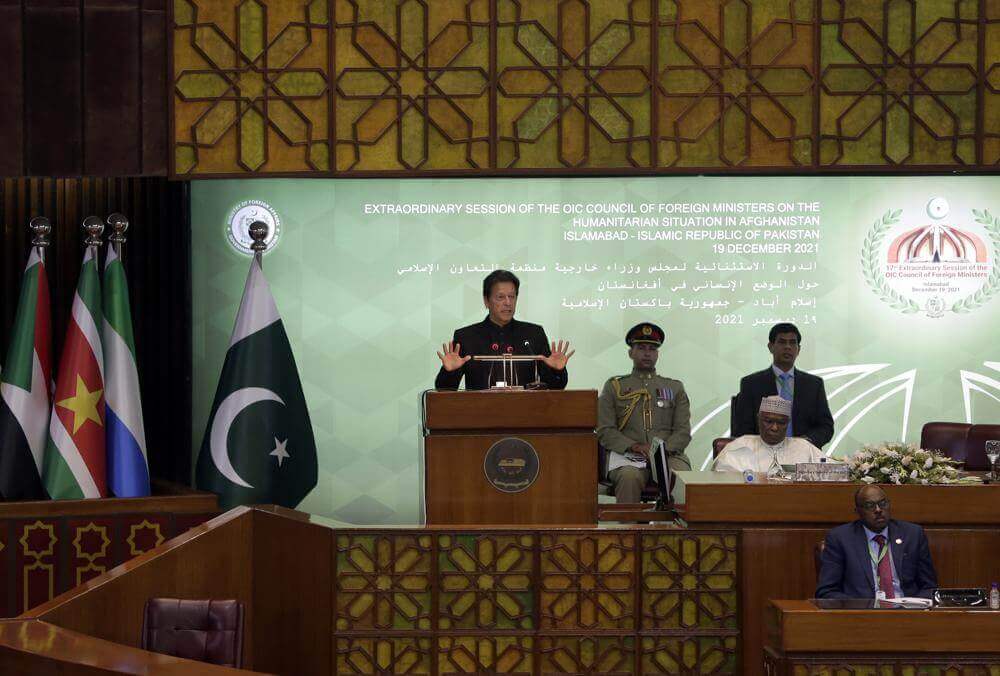The 57-member Organization of Islamic Cooperation (OIC) on Sunday pledged to provide aid to Afghanistan in order to avoid an economic collapse. The 17th extraordinary session of the OIC, which was held in Islamabad, was also attended by special envoys from the United Nations (UN), the United States (US), and the European Union (EU), as well as a Taliban delegation led by interim Afghan foreign minister Amir Khan Muttaqi.
Members pledged to set up a humanitarian trust fund dedicated to providing humanitarian aid to Afghanistan through the OIC’s Islamic Development Bank. According to the Associated Press, the bank will “provide a cover for countries to donate without dealing directly” with the Taliban.
Also Read: Does the Delivery of Aid to Afghanistan Inherently Legitimise the Taliban?
The OIC also appointed assistant Secretary-General Tariq Ali Bakheet as its special envoy on Afghanistan. Bakheet will “follow up on the implementation of the resolution” to establish the fund and coordinate “efforts for the supply of humanitarian assistance to the Afghan people.”
Furthermore, the OIC announced the formation of an Afghanistan Food Security Programme and said it would be cooperating with the UN “for mobilising relevant fora” to “unlock financial channels to resume the flow of humanitarian assistance.” Additionally, members pledged to work with the World Health Organization (WHO) “for securing vaccines as well as other medical supplies […] in the context of COVID-19 and other persistent and emerging health concerns.”
Pakistani Prime Minister (PM) Imran Khan, who hosted the meeting, said that Afghanistan could become the “biggest man-made crisis” if the world does not act immediately to contain the humanitarian and economic crisis gripping the country. “Unless action is taken immediately, Afghanistan is heading for chaos,” he said.
Pakistan hosted the 17th Extraordinary Session of the @OIC_OCI Council of Foreign Ministers on #Afghanistan.
— Government of Pakistan (@GovtofPakistan) December 19, 2021
🎥 An overview 🎥#OICInPakistan#OIC4Afg
via @FMPublicDiploPK#PakistanDiplomacy 🇵🇰 pic.twitter.com/l4Ccj0tL2n
He also urged the US to unfreeze funds keeping in mind the plight of 40 million Afghans. The US and other western countries blocked millions in aid to Afghanistan after the Taliban seized control in August. Furthermore, Khan called on the Taliban to take certain steps, including the formation of an inclusive government that respects human rights and prevents Afghanistan from being used as a terrorist base.
In this respect, the Taliban said that it was moving in the right direction and called on OIC members to reopen their embassies in Kabul. Interim FM Muttaqi said that as a “member of one family”, Afghanistan is ready to accept requests and advice of the OIC in order to move “towards a proper and just roadmap and direction.”
Muttaqi said that the Taliban “has secured its geography and territorial integrity, established security, [and] does not pose a threat to any world country.” Therefore, the group “reserves the right to have formal relations with the world and be a responsible member of the wider international community,” he added.
He also criticised the US’ freezing of funds to Afghanistan and said that it “is a clear violation of the human rights of Afghans, and can be interpreted as enmity with an entire nation.” He added: “Such actions harm American prestige and exacerbate the refugee crisis, the detrimental effects of which will not spare the wider world.”
Meanwhile, UN under Secretary-General for Humanitarian Affairs Martin Griffiths, who addressed the session virtually, warned that the Afghan economy is in “free fall” and said that if “decisive action” is not taken immediately, it could worsen the situation for millions of Afghans. Therefore, he added that the “need for liquidity and stabilisation of the banking system is now urgent to save the lives of the Afghan people [and] enable humanitarian organisations to respond.”
Griffith noted that Afghanistan is facing unsustainable levels of inflation, with the cost of wheat and fuel up by 40%, and basic social services collapsing due to a lack of international support. He also forecasted that 97% of the Afghan population could be forced into poverty by mid-2022 and that the country could lose 30% of its GDP within a year if measures are not taken to address the crisis.

